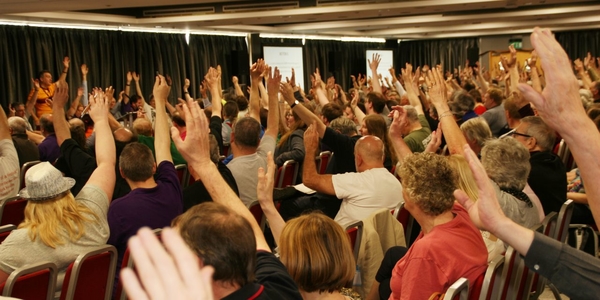CAMRA: past, present...and future
Added: Monday, April 23rd 2018

As Mark Twain might have said, “Reports of CAMRA’s death have been greatly exaggerated”. Following the campaign’s annual meeting on 21 and 22 April, I would like to clarify some issues regarding the decisions taken, CAMRA’s work over the past 47 years, and the beer market as it is today.
First, let it be said without fear of contradiction that CAMRA, whatever its faults, is a deeply democratic organisation. Not just those attending the AGM in Coventry but the entire membership, totalling 192,000, were asked to vote on a series of changes to the campaign’s governing rules known as the “articles of association”. These changes were the result of a two-year consultation known as the Revitalisation Project, designed to make CAMRA more relevant in a beer world that has changed beyond all recognition since it was founded in 1971.
18,000 voted, which is broadly typical of active engagement in a large membership organisation.
All the proposals except one were agreed and these were progressive, including embracing greater diversity and equality.
The one that failed was seen as the major key to change: to make the campaign speak for all pubgoers and beer drinkers. 72.6 per cent of those voting supported that recommendation but under company law – and CAMRA is a limited company – 75 per cent had to vote in support. As a result the proposal failed by less than 3 per cent.
The conference also voted to allow CAMRA beer festivals to stock beers other than cask-conditioned real ale. That is already happening and I suspect the trend will grow.
One successful candidate for the campaign’s national executive, Lynn Atack-- and I do not believe these old school, dogmatic views to be typical of the executive -- said that if CAMRA became the voice of all beer drinkers and supported modern craft keg beers there would be a return to the 1970s when keg beer ruled and cask ale was almost wiped out.
The facts prove otherwise. In spite of the dramatic increase in the number of breweries, overall consumption of beer is in decline. Cask ale has fared better than other types of beer. Figures for 2017 show total keg -- that includes such traditional keg beers as John Smith's and Tetley -- down by 25 per cent, lager by 11 per cent and cask by just 5 per cent.
The British Beer and Pub Association, the voice of big brewers and pub companies and not a great friend of CAMRA’s, says “Cask is out-performing the market”.

In spite of all the noise and brouhaha around craft keg beer, it accounts for just 5 per cent of the beer market. It did grow market share in 2017 but remains a small sector. It’s not a threat to cask beer: research by Heineken shows that most drinkers of craft keg were previously lager drinkers. In other words, craft keg is not in general taking sales away from the real ale sector. The reason why global brewers such as AB InBev, Carlsberg and Heineken are buying or investing in craft keg breweries is that, while it’s a small sector of the market, it’s highly profitable.
To those who argue that CAMRA, as a result of the AGM decisions, is no longer relevant, look at the campaign’s history. When it was founded in 1971, a wave of takeovers and mergers had created six national brewing groups whose main aim was to foist dreadful keg beers such as Double Diamond and Watney’s Red Barrel along with dismal parodies of European lager on the British drinking public. Old family breweries were disappearing at a rate of knots.
Young CAMRA was a small organisation but with a powerful voice. As a result of its campaigning, beer festivals and publications such as the Good Beer Guide, it created such a demand for traditional cask beer that the sector started to revive, takeovers slowed down and more and more pubs stocked handpumped beer again.
Let there be no doubt that but for the efforts of CAMRA back in the 1970s and 80s there would not be 2,000 breweries operating today. We would all be drinking the likes of Stella Artois, American Budweiser, Heineken and John Smith’s Smooth.
I voted for change. I would like CAMRA to be the voice of all pubgoers and to campaign to save pubs. While I will always drink real ale as my beer of choice, I recognise that many modern craft keg beers are of excellent quality and are worthy of attention.
But I also accept that, as a result of its founding aims, real ale must always be central to the campaign’s activities. No other country produces large amounts of cask-conditioned beer. It’s part of Britain’s history and heritage and it is to CAMRA’s great credit that it has been saved, restored and revived.
This is not the time to resign from CAMRA or tear up membership cards. In a few years’ time it may be possible to revisit the call for the campaign to speak for all pubgoers and the necessary majority may vote in favour.
In the meantime, let us salute CAMRA’s achievements and continue to support a movement that campaigns for good beer and the pubs that serve it.





